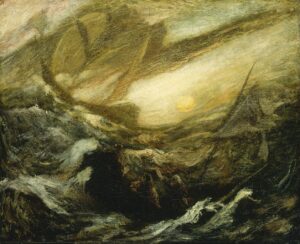 Opera in Germany has a tough time. Actually Germans seem to love opera. The productions are numerous and well attended. But despite their love of opera, Germans tolerate some of the most iconoclastic and even nihilistic productions. One of my German friends tells me that they don’t merely tolerate weird productions, they demand them. I can’t speak for the demand, but the supply is abundant.
Opera in Germany has a tough time. Actually Germans seem to love opera. The productions are numerous and well attended. But despite their love of opera, Germans tolerate some of the most iconoclastic and even nihilistic productions. One of my German friends tells me that they don’t merely tolerate weird productions, they demand them. I can’t speak for the demand, but the supply is abundant.
Several years ago, I wrote a review of Carmen on this site called Drive-In Opera. Staged outdoors between the two major cathedrals of Erfurt, Germany, the opera’s setting was changed to an auto junkyard. You can read the details at the link, but it was a lighthearted play on the name: Car men.
Some years earlier, Carol and I attended Humperdinck’s Hansel and Gretel in Weimar. The opera did its best to paint the children as anything but innocent lost souls. One might even be driven to sympathize with the parents desire to abandon them in the woods. We joke now that by the end we were routing for the witch.
I passed on the opportunity two years ago to review a different production of Carmen at the Weimar opera. It was more or less traditional and very well performed. But sometimes the zinger is saved for the end, as in this instance when Don José opted not to stab Carmen. Why did he allow her to walk away? We’ll never know, just as we’ll never know why they shot the Pilgrim in the final seconds of Der Freischütz at the Gewandhaus in Leipzig. Carol was shocked at that. We spoke to the singer who played the role immediately afterwards, and he too admitted being perplexed. It sends no message other than to make the point that the director can do whatever he wants.

So on my current visit to Weimar, I went to see Richard Wagner’s The Flying Dutchman. I was warned in advance, but I’ve come to expect weirdness. Instead of the captain of the ghost ship being cast ashore, the opera takes place on an offshore drilling platform. No doubt you can see the political message coming. Grainy film was projected onto the stage during the overture and through much of the opera. The visuals opened with lovely meadows and flowers and mountains but quickly dissolved into ugly refineries and pollution. And that first two minutes of flowers was the last thing I saw that resembled beauty.
If you closed your eyes, you could hear a fine orchestra and accomplished singers doing what Wagner expected them to do. But the ugliness demanded your attention and distracted you from Wagner’s music and drama. The stage was awash in three inches of water; the singers wore rubber boots. The second act features a women’s chorus. They all had babies who were taken one-by-one and dipped into an oil drum, this baptism sending the apparent message that oil will destroy the next generation. Watching this you might forget that the two main characters were simultaneously singing about love and redemption.
I could not make any connection between the opera and oil. Wagner, I’m pretty sure, had no opinion on the exploration for fossil fuels, although gladly expressed his opinions on just about everything else.
The distractions continued throughout the opera—two and a half hours with no intermission. The grainy films accompanied almost every scene with images of suffering masses, destruction and despair. I will spare you many other still cruder diversions.
Meanwhile, in case you missed it, the love between the Dutchman and Senta leads them both to redemption. But not before Senta sets fire to the drilling platform (reminiscent of Götterdämmerung) and Eric, who has failed in his attempts to woo Senta, pulls out a gun and shoots her (reminiscent of the gratuitous ending of Der Freischütz in Leipzig).
Come to think of it, gunfire also erupted at the end of Salome in Weimar, a rather curious anachronism. We might wonder which opera will be commandeered in the future to address the senseless gun violence in opera productions.
For me, the shallowness of the water on stage became a metaphor for the whole production. What is so unsatisfying about The Flying Dutchman that it needs some contemporary supplement? The oil platform seems so irrelevant. I can think of only one answer. For the director, the political message is the only thing that matters. It is Wagner instead who is irrelevant, who can be sacrificed to score a political point, just as paint can be thrown on a Da Vinci or tomato soup on a Van Gogh.
Still, I think Wagner wins. The major artworks, the crowning achievements of Western Culture, are an indictment of our current cultural mayhem. For now at least, the Mona Lisa still smiles at those who throw pies at her. Fortunately, music exists in a medium that cannot be so easily destroyed. The danger is that our senses will become too overwhelmed with shallow distractions to recognize enduring beauty.




Excellent article. Thank you.
This is exactly what makes me so sad about so much art (or what passes for it in the modern world): the need to put the political message first. Goodness, truth, beauty, and real humor can all take a backseat. Art can certainly involve social or political commentary; Shakespeare has plenty of that, but it’s not the entire point of his drama, and the plays stand very well by themselves as masterpieces even without taking into consideration those messages. Unfortunately, we have become incapable of separating the art and the “message.” Thank you for expressing these ideas so well!
Not related, but something enjoyable: a sort of mashup of famous themes from composers ranging from Bach to Smetana to John Williams:
https://www.youtube.com/watch?v=7OYkWSW7u4k
And it works! The amount of thought that must have gone into this amazes me!